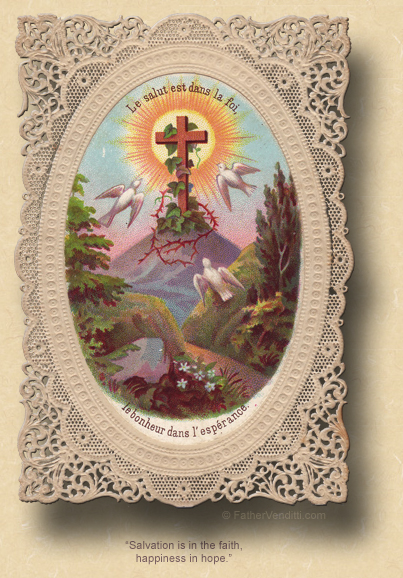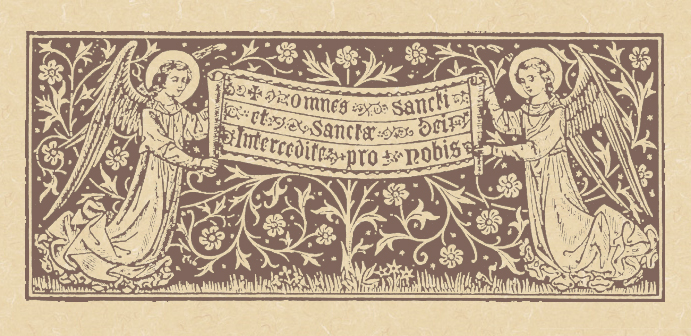The Zen of Riding the Rapids.
The Memorial of Saint John Baptist de la Salle, Priest.*
Lessons from the feria, according to the ordinary form of the Roman Rite:
• Acts 5: 27-33.
• Psalm 34: 2, 9, 17-20.
• John 3: 31-36.
The First Thursday after Easter.**
Lessons from the dominica,*** according to the extraordinary form of the Roman Rite:
• 1 John 5: 4-10.
• [The Gradual is omitted.]
• John 20: 19-31.
Thomas Thursday; and, the Feast of Our Venerable Father George, Bishop of Mitylene.
Lessons from the pentecostarion, according to the Ruthenian recension of the Byzantine Rite:
• Acts 4: 23-31.
• John 5: 24-30.
FatherVenditti.com
|
 8:33 AM 4/7/2016 — Blessed John Henry Newman once said that change is the only evidence of life. To him it was a statement of hope, but all too often to us it's a cross. All around us there is constant movement, an ebbing and flowing of currents of opinion, of doctrines, of ideologies, of very different interpretations of man and morality. Being, as we are, in the thick of the current political season, we can see first hand the passions that differences of opinion can cause. Spiritually, it takes its toll, and may even accentuate for us the differences we so often suffer in the Church. 8:33 AM 4/7/2016 — Blessed John Henry Newman once said that change is the only evidence of life. To him it was a statement of hope, but all too often to us it's a cross. All around us there is constant movement, an ebbing and flowing of currents of opinion, of doctrines, of ideologies, of very different interpretations of man and morality. Being, as we are, in the thick of the current political season, we can see first hand the passions that differences of opinion can cause. Spiritually, it takes its toll, and may even accentuate for us the differences we so often suffer in the Church.
Being a Shrine of devotion focused on the apparitions of our Blessed Mother at Fatima, we tend to attract here a traditionally minded crowd, and I don't think a day goes by that something isn't said, both in and out of confession, about how disturbed some people are by what they perceive is happening in the Church. Some people feel genuinely guilty and disturbed by what they find themselves feeling or thinking about the Holy Father, or this bishop or that, or about the priest in their home parish. There's never any malice in it, otherwise it wouldn't disturb them so.
We've talked about this before, and there's little need to do so again, except that we have such a timely example given to us in today's first lesson. The Apostles' resistance to obeying the commands of the Sanhedrin was not a matter of pride or refusing to submit to legitimate authority, nor was it a matter of ignorance or a lack of sophistication compared to the so-called learned in the faith. They resisted because the Sanhedrin wished to impose on them a command which was against the law of God. Nor was it necessary for them to show the Sanhedrin their academic credentials, any more than any of us need to produce a doctorate in sacred theology in order to know instinctively that something said by someone is wrong. Raised in the Faith of the Church, we may not be able to explain to someone else exactly why something said by someone is wrong; we just know it. When the events being recounted this week in the first lessons of Holy Mass were presented previously at the end of Easter Week, we noticed how the Blessed Apostles Peter and John made a specific point of emphasizing before the council how their preaching of the resurrection of our Lord was not based on intellectual conviction—the scribes themselves remarked on the fact that they were “uneducated, ordinary men”—nor was it based on some emotional experience. Their preaching was based, quite simply, on the fact that they had seen our Lord alive! In other words, it was a specific experience of faith that taught them the truth of what they were preaching.
The fortitude and conviction of these first defenders of a politically incorrect faith is exactly what our Lord is asking from His followers today. But the real lesson we need to glean from this episode from Acts is that the Apostles showed no evidence of the tension and agitation and anxiety we so often show when faced with a similar situation. Peter and John engaged in no hand-wringing, they didn't raise their voices, they didn't become discomposed or upset in any way. The fact that they were the only two people in the room who believed what they believed, even the fact that they were being threatened with prison if they didn't stop preaching it, didn't effect the tranquility of mind and serenity of spirit that is the surest evidence of a person of faith. They knew the truth of what they believed and preached, they didn't simply suspect it. It was as certain to them as was their own existence.
Not only did they feel no need to prove anything to the Sanhedrin,—perhaps even more importantly—they felt no need to prove anything to themselves; and, when we, who are legitimately concerned for defending the faith, exhibit a less than tranquil attitude, our agitation, far from showing the steadfastness of our convictions, actually betrays the extent to which we are lacking in those most necessary virtues of Faith and Hope. “…[T]he man who belongs to earth talks the language of earth,” says our Lord to us in the Gospel lesson, “but one who comes from heaven must needs be beyond the reach of all; he bears witness of things he has seen and heard, [even if] nobody accepts his witness” (John 3: 31-32 Knox).

* Jean-Baptiste de la Salle (d. 1719), a secular priest of the Diocese of Rheims and member of the Cathedral Chapter, gave away his fortune to become a priest and, in 1680, founded the Brothers of the Christian Schools, today numbering some 4,975 members. He authored the Conduct of Schools, which guided the establishment and administration of Catholic schools for hundres of years, and is regarded as the Patron Saint of teachers.
The Cathedral Chapter, sometimes called the “Chapter of Canons,” is one of the most misunderstood institutions in the Church, primarily due to bishops who dole out the title of “Canon” to any priest who has done them a favor, even though this practice is not only improper, but always was even in the “old” Code of Canon Law. Since, by mutual arrangement, the bishops of the United States have agreed never to establish Cathedral Chapters in this country, any priest here who claims that title and who wears the costume of a canon probably got the title improperly from some bishop in another country (usually Poland) in exchange for a sizable donation to that bishop's diocese or cathedral.
According to the current Code of Canon Law, the Cathedral Chapter is composed of priests of the diocese, one of whom is the rector of the cathedral (the bishop of the diocese is always the pastor of the cathedral parish), and the parochial vicars of the cathedral parish. As members of the Chapter, they live together in the cathedral rectory which, in this case, would be called a Chapter House. Though not religious, they are bound to recite together the Divine Office publicly in the cathedral every day, though the Code makes allowance for some of them to actually serve as pastors of nearby parishes if such a need exists. The purpose of the Chapter is to advise the bishop in matters of administration, and to elect an administrator for the diocese when it becomes vacant; and, the Code elucidates certain decisions which the bishop can make only after consulting the Chapter, such as the erection or suppression of parishes or the contentious removal of a pastor. It is—and has always been—forbidden for a priest outside the diocese to be named a member of the Chapter or to be called a Canon, which is why the “Polish practice” mentioned above is wrong.
In dioceses where there is no Cathedral Chapter, as is the case throughout this country, the administrative duties of the Canons are assumed by a group of priests known as the College of Consultors, all of whom are appointed by the bishop, but who have no obligation to live together in common, and which meet together only when called to do so by the bishop. Both the Chapter of Canons and the College of Consultors are separate and distinct from the Presbyteral Council, composed of both elected and appointed priests who advise the bishop on less formal matters.
** According to the Missal of Saint John XXIII, "The First Thursday after Easter," meaning the Thursday of the first week after the Octave; it is a feria of the fourth class.
*** On the ferial days outside of privileged seasons, the lessons are taken from the previous Sunday.
|

